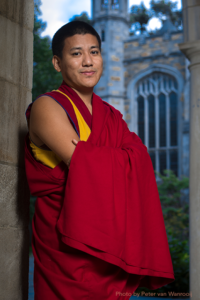So sufferings and all these problems are here; we have the problems, but we cannot recognize them. Remember we are talking about the realm, happiness and sufferings are there all the time, together. Sometimes, when we have more happiness, we forget to recognize those small things that exist there underneath our fancy happiness. It is important to recognize this. To recognize it, we have to think about it, we have to practice. Thinking about suffering is also one of the important points. Thinking about suffering is not feeling suffering. You don’t have to cry, or feel it. You have to recognize it. We always say that things are like delusions, so this is something like that. It is not like we don’t have the possibility of getting problems. It is always possible that we could get a disease or any kind of things. It is possible, really. If you are smart, you will recognize this.
When I was in the monastery, I heard about somebody who had had appendicitis. I heard that he was suffering, “Oh, I see,” but I never thought that suffering would come to me. Then, after a year, I got the same problem. I remember thinking, “Oh, a year ago I didn’t think I could get this disease.” This does not mean that if something is there it will come to you, but we have to be aware of the possibility of getting it.
Actually, Americans are so smart. They take all the vaccinations, because they realize they might get the disease. “Oh, yeah, I will take the vaccine, a flu shot,” all kinds of shots. That is smart and shows that you recognize the suffering you are talking about. Even though you are healthy and have no disease, still you are susceptible and vulnerable to it. That means you understand the suffering. You don’t have to feel the suffering right now, and you don’t have to have those problems with you right now, but you need to be aware of your vulnerability to it.
Here we are not talking about disease, but about other things, all the kinds of samsaric suffering. You are vulnerable to being born as an animal, in a dog’s body for nine years or more. Then, if you recognize that it is not only me, but all other sentient beings, you have to do something.
I always talk about that funny, animated movie “Chicken Run.” It is like a bodhisattva’s movie, actually. It is about a chicken in a chicken farm who wants to escape and is very clever. He finds how to get out from there and run away. But when he gets out, he thinks, “Now what? There is no meaning. I should go back and bring all the chickens out of there.” That is like a bodhisattva. The idea is that if you do something for yourself, that is not that worthwhile, but if you do it for everybody, it is worthwhile. That is a good example, whether it is animated or whatever.
The thing is that you feel it, you can see the value and then you exchange with other chickens or sentient beings. This is a simple way to understand a bodhisattva. That practice is the great people’s practice. To do this, first you have to know the problem. That is why the movie depicted a chicken. If it was the farmer, he wouldn’t care about a chicken’s life. But the chicken was suffering there along with the other chickens, and so he could understand the problem, and wanted to run away and find the happiness of being out of the farm. Then he wanted to share it with the others. If you have seen the movie, you will understand what I am saying. You may be watching a funny movie, and maybe think they are funny Buddhists! I don’t care whether it is funny, I care about what brings the message.
~ Demo Rinpoche, Jewel Heart Ann Arbor, Lam Rim Teachings, February 25, 2019


